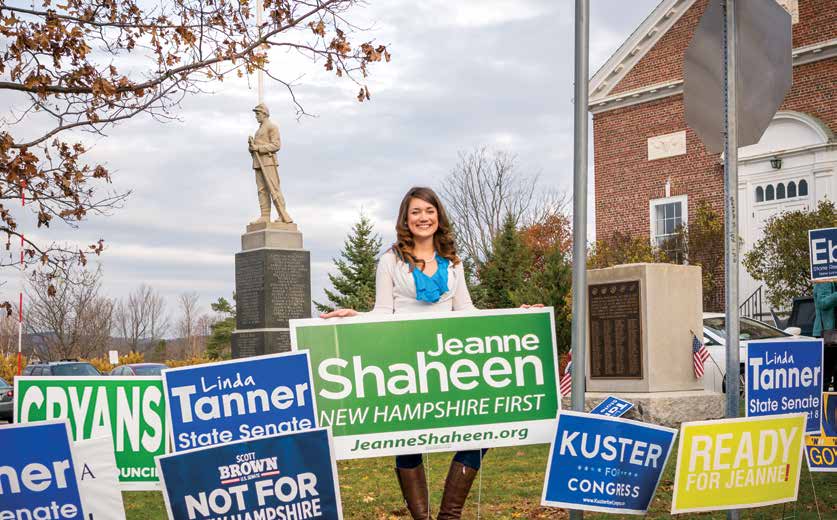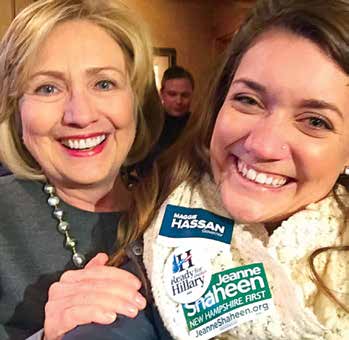
ENGAGING THE 79 PERCENT:
A Fight Against Political Apathy
The text was brief, simply an instruction to go to the Puritan Backroom restaurant in Manchester, but it was quite possibly the most important text message that history and political studies major Krista Peace '15 has ever received. Having just helped organize a preelection rally at Nashua Community College for New Hampshire Democratic candidates, Peace arrived at the Puritan Backroom moments before Democratic Sen. Hillary Clinton of New York arrived. For Peace, meeting the source of her political inspiration face-to-face was the payoff for months of often unseen work organizing events in a particularly hard-fought campaign season. “I think I might have blacked out a little bit because I was so excited, but somehow I kept it together enough to ask for a picture,” said Peace. “I was so excited that my hands were shaking and I botched the first one. Luckily, Sen. Clinton just laughed, hugged me and allowed me to take a second with her. Taking a selfie with Sen. Clinton … it just doesn't get any better than that.
This young Democratic Party activist's high note was followed by a low—an election wave that swept the Republican Party into control in the Senate and increased the already strong Republican majority in the House of Representatives. “Election night was really difficult, an evening of contradictions and intense emotions,” Peace said. “On the one hand, the New Hampshire races I was a part of went well, but on the other, the TV screen would switch over to the national picture and my excitement would evaporate.”
Peace recognizes that this is all part of the thing she loves. “Politics is a rollercoaster of good and bad, and you have to roll with the lows to enjoy the highs,” she said. It is to this rollercoaster of highs and lows, victories and defeats, that Peace is attempting to invite the students of Colby-Sawyer.
Peace came to New Hampshire from Santa Barbara, Calif., to attend boarding school in the White Mountains at the age of 15, and as she tells it, “everyone thought I would go flying right back to California after I graduated, but I fell in love with New England.” After attending a school with only 100 students, Peace thought she wanted to go to a big university and chose the University of Vermont. “I quickly realized that 13,000 was just too big, so I went back to my list of schools and narrowed them to two,” said Peace. “What brought me to Colby-Sawyer was my admissions counselor. I must have called 11 times a day while making this decision, and each time Tracey Perkins '01 knew my name and my story; she was just so patient, relaxed and funny, I knew this was where I belonged.”
Peace's interest in politics took a similarly circuitous route. She began her college career as an elementary education major but became frustrated because “everything I wanted to change came back to the politics of public education … everything that bothered me, that was important to me, came back to politics.” This initial interest in politics may never have grown had it not been for Peace's internship in the office of U.S. Rep. Annie Kuster (D–N.H). It was during this internship, when she was out in the field organizing events for the representative, that Peace fell in love with politics.
 Now, after helping to organize events for Democrats including Sen. Clinton, Rep. Kuster, Sen. Jeanne Shaheen of New Hampshire and New Hampshire Gov. Maggie Hassan, Peace has taken on a challenge that has bedeviled political activists for generations: engaging, empowering and inspiring young voters.
Now, after helping to organize events for Democrats including Sen. Clinton, Rep. Kuster, Sen. Jeanne Shaheen of New Hampshire and New Hampshire Gov. Maggie Hassan, Peace has taken on a challenge that has bedeviled political activists for generations: engaging, empowering and inspiring young voters.
Behind all the speeches, ads and events, politics is ultimately a game of numbers: numbers of volunteers mobilized, doors knocked on and voters turned out on Election Day. In this world of numbers, the 21 percent midterm election turnout rate for voters aged 18–29 is the equivalent of a yawn. What makes this number both ironic and tragic is that 79 percent of these young people choose not to vote precisely when their perspective is most needed.
At a time when Americans are reeling from seismic shifts on issues like gay marriage and drug policies, when students struggle to pay tuition and find employment after college, the apathy and disengagement of America's youth constitutes nothing less than a political crisis, a crisis that Peace has dedicated herself to taking on. As she put it, “I want to see young people vote because these are our issues; these are issues that directly touch our lives. I hear students discussing debt, the economy and war all the time, so it's frustrating that they have so little interest in voting for the politicians who represent them on these issues.”
Peace recognizes that the barriers to young people's political participation are both institutional and cultural, but she's convinced that education and exposure are key to engaging her fellow students. “Many students are like me: They grew up hating politics and politicians because everyone around them hated politics,” she said. “This seems to be a part of our culture, but I know that exposure to politics and information about politics is part of the answer. I haven't found the right formula yet, but my hope is that I can help set the stage for that event, decision or discussion that creates interest and engagement.”
Peace's efforts to engage the 79 percent have only just begun, but her efforts have already paid off for the Colby-Sawyer community. On Oct. 29, Peace organized an event that brought Sen. Tammy Baldwin (D–Wisc)., to a Colby-Sawyer classroom overflowing with students, staff and faculty. The first openly gay senator in U.S. history, Baldwin is evidence of the power of the youth vote—the senator's entire political career, from her first local election up to her statewide senate bid, has been propelled by her ability to engage young voters. During her talk, she noted the difficulties of mobilizing this country's youth but urged the Colby-Sawyer community to see politics as the way to initiate important discussions that lend a voice to the voiceless so that they can speak truth to power.
It is Peace's hope that this is just the beginning for both Colby-Sawyer and her own political path. As the 2014 midterm elections fade into memory, the race for the 2016 presidential nominations are just beginning, and Peace is positioning Colby-Sawyer to be a campaign stop for those who seek the nation's highest office.
- Associate Professor of Social Sciences and Education Eric Boyer
Professor Boyer joined the faculty in 2008. He holds a B.A. in political science and philosophy from the Indiana University of Pennsylvania and a Ph.D. in political science from the University of Minnesota.
About Colby-Sawyer College
Colby-Sawyer College is a comprehensive college that integrates the liberal arts and sciences with professional preparation. The College's faculty, staff and students strive for excellence in an engaged teaching and learning community that fosters students' academic, intellectual, and personal growth. With a strong emphasis on learning outcomes, including breadth and depth of knowledge, self-growth, creative and critical thinking, and effective communication, Colby-Sawyer prepares students to thrive post-graduation and make a positive impact upon a dynamic, diverse, and interdependent world.
Founded in 1837, Colby-Sawyer is located in the scenic Lake Sunapee Region of central New Hampshire. Learn more about the College's vibrant teaching and learning community at www.colby-sawyer.edu.


